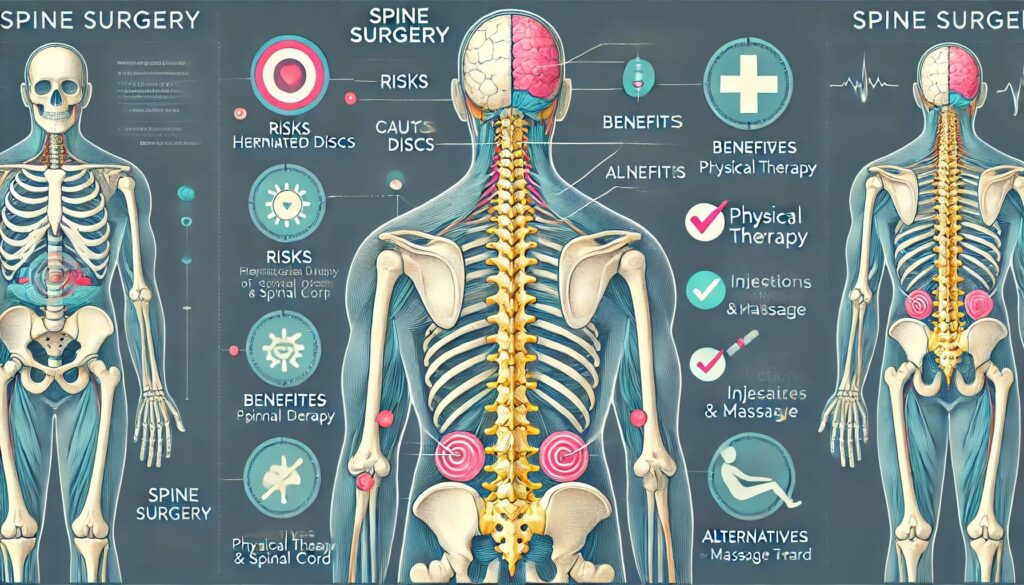Spine surgery is often the last resort for treating structural problems in the spine. It aims to realign and repair damaged or decompressed spinal structures. For many people, it can provide much-needed relief from pain and improve mobility. However, like any other surgery, it carries certain risks, making non-surgical alternatives a better option.
Conditions That Require Spine Surgery
Several conditions may necessitate spine surgery. Some of the most common ones include:
- Herniated Disc: The soft centre inside a spinal disc bulges out and presses on nearby nerves, leading to pain, numbness, or weakness.
- Spinal Stenosis: A narrowing of the spinal canal that puts pressure on the spinal cord and nerves.
- Degenerative Disc Disease: The breakdown of spinal discs, resulting in pain and limited function.
- Scoliosis: A sideways curvature of the spine that, in severe cases, may require surgical intervention.
- Spinal Fractures: Vertebrae can break due to trauma or osteoporosis.
- Spinal Tumors: Abnormal growths that may need to be surgically removed.
- Spondylolisthesis: When one vertebra slips forward over the one beneath it.
- Chronic Back Pain: Surgery may be an option when non-surgical treatments fail.
- Spinal Infections: Severe infections like osteomyelitis or discitis may require surgical debridement or stabilisation.
The Recovery Process
Recovery after spine surgery varies depending on the procedure and the patient. Hospital stays typically last a few days, with pain management and possibly physical therapy starting early. Most people can return home within a week but should avoid heavy lifting or strenuous activities. Full recovery often takes several months, during which patients must follow their doctor’s instructions closely. Regular check-ups ensure the recovery process is on track.
Risks of Spine Surgery
Every surgery carries risks, and spine surgery is no exception. Some of the potential complications include:
- Lower back pain
- Infection
- Bleeding
- Spinal fluid leakage
- Nerve damage, leading to leg discomfort, numbness, or weakness
- Bowel or bladder issues due to nerve damage
- Spinal deformities such as spondylolisthesis or kyphosis
- Incomplete nerve decompression
- Recurrence of symptoms
- Adjacent segment disease
- Scoliosis
- Paralysis, in rare cases, due to spinal cord damage
It’s essential to have a thorough discussion with your doctor about the risks and how they apply to your specific case.
Alternatives to Spine Surgery
In many cases, non-surgical treatments can provide relief and improve mobility, allowing patients to avoid surgery. Some of these alternatives include:
- Physical Therapy: Strengthening and increasing the flexibility of the muscles around the spine can reduce pain and improve mobility.
- Chiropractic Care: Chiropractic treatment focuses on the musculoskeletal system and can relieve discomfort and improve range of motion.
- Massage Therapy: Massages can release muscle tension and improve blood flow, reducing pain.
- Injections: Corticosteroids or hyaluronic acid can be injected to reduce inflammation or lubricate joints.
- Regenerative Medicine: Techniques like stem cells or plasma injections aim to repair damaged tissues.
- Intracept Procedure: This involves using radiofrequency energy to destroy the nerves responsible for pain in the spine.
- Spinal Cord Stimulator: This minimally invasive method blocks pain signals by sending electrical impulses to the spinal cord.
Conclusion
Deciding whether to undergo spine surgery is a crucial choice that requires weighing the risks and benefits. Always discuss your options with a healthcare professional to determine the best course of action for your individual needs.
About ANSSI:
ANSSI Wellness focuses on improving the quality of life for patients suffering from spinal issues, aiming to provide relief where other conventional treatments have failed. Through advanced non-surgical spinal decompression treatment, ANSSI is committed to helping patients avoid surgery and recover in a safe, effective, and compassionate environment.



